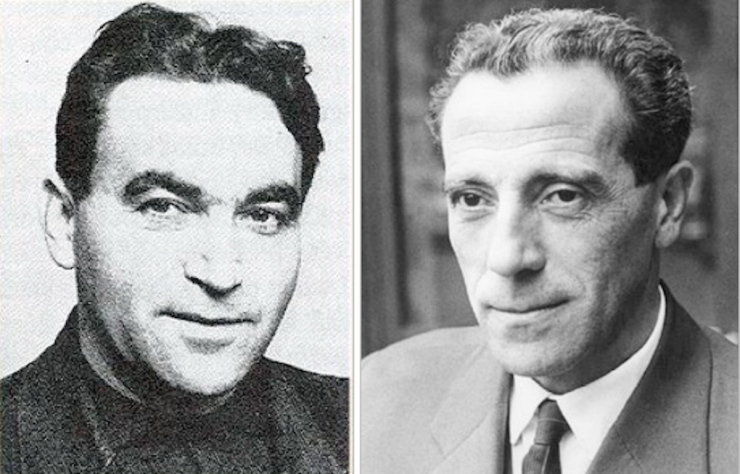Chlapi si zaslouží velkou poklonu a uznání. Nevím ale, jestli to někoho z mladších generací vůbec zajímá. Myslím, že ne, Velká škoda.
7 April 1944 Escape of Vrba and Wetzler from Auschwitz
Categories: Personalities , Second World War , War crimes , Calendar

During the Second World War they were sent to Auschwitz, where they stayed for about two years. Rudolf Vrba and Alfred Wetzler managed to escape from the concentration camp on 7 April 1944. They gave testimony about the atrocities the Nazis committed against the Jews. This information was leaked to the BBC and the New York Times.
Vrba was a Slovakian Jew who was arrested by the Nazis when he tried to flee his homeland. He was sent to Auschwitz and his first job was to dig up corpses that the commanders wanted to burn. Fortunately, it didn't take too long and Vrba was transferred to one of the camp's warehouses. His cellmates called him Canada. It contained clothes, food and medicine. Willow started stealing supplies. "That kept him pretty healthy, too. In January 1943, he was transferred to nearby Auschwitz III - Birkenau, where he carefully counted incoming prisoners and also recorded the personal belongings of those who had been gassed in the camp. She was thus able to add up the numbers of those murdered," Milton Giles describes in his prose work, When Hitler Took Cocaine and Stalin Robbed the Bank.
In the spring, Vrba arrived at the incredible figure that 1,750,000 Jews had been executed in the camp. He also deduced that those arriving at the camp believed the Nazi fabrications that they were merely being resettled. Vrbas was seething and felt obliged to inform the European Jewish population about the atrocities happening in the camp.
Wetzler was imprisoned in Bratislava for four months before being sent to Auschwitz. He was arrested in 1941 for sabotaging the brickyard where he worked. He was transferred to Auschwitz-Birkenau on April 13, 1942 from the Slovak concentration camp in Sered. In Auschwitz he worked as a corpse carrier, a scribe or a member of an underground work group. He was registered under number 29 162. Over time, Wetzler also matured the idea that he had to escape from Auschwitz and testify.
He succeeded in doing so together with Vrba on 7 April 1944. They knew very well that their absence would come to light during the evening presentation. "And they also knew that the SS would launch an intensive search that would last at least three days. That is why they decided to stay in the timber between the perimeter fences for more than seventy-two hours and then head for Svoboda," Giles further states.
During the fourth night in hiding, they cut through the perimeter fence and escaped. They wore Dutch clothes and shoes that they had stolen from the warehouse. They headed towards the Polish border with Slovakia, which was about 130 kilometres away. After two weeks, they reached the Slovak town of Čadec, where they met the chairman of the illegal Jewish Council, Oscar Neumann. Together they wrote a letter that made it to the BBC and the New York TImes.
Until the end of the war, Wetzler was a member of the active resistance and fought during the Slovak National Uprising. In 1945, he published a book titled Auschwitz, Tomb of Four Million. Vrba went to Prague after the war, earned a doctorate in technical sciences and devoted his studies to the biochemistry of the brain.
Sources: Milton Giles: When Hitler Used Cocaine and Stalin Robbed the Bank, www.uzzno.sk, Karel Pacner: Extraordinary Moments in History, www.novasynagoga.sk
The article is included in categories:
- Archive of articles > Personalities
- Archive of articles > Wars > Second World War
- Archive of articles > Wars > Second World War > War crimes
- Archive of articles > Calendar
Post
Ale jo, zajímá. A je potřeba pořád to dětem opakovat, aby věděli co to byly nacistické a komunistické lágry a gulagy. Jinak se to vráti!
Tak v tomto já jsem docela skeptik. Dnešní generace má úplně jiné problémy. Stačí mrknout na průzkum, kde na dotaz, jestli by šli, v případě potřeby, bránit svou vlast, kladně odpovědělo snad jen 30% dotázaných. Je dobře, že ne 100%, ale tak to je.
To je dost těžká otázka, ono proti komu by jsi ji chtěl jít bránit? Ale tohle téma raději opustím, myslím že to co by následovalo sem nepatří.
To je velmi dobrá otázka. Bránit vlast znamená se například zřeknout zaplacené dovolené, když hrozí koronavirus. Řekl bych, ze tak těch 30% odpovídá. Ale není to málo, dle mého. I tenkrát vetsina bojovala především proto, že musela. Oni ty problémy mladé generace také nejsou nic malicherneho. Vydělat 5 mega na byt je taky dobrý nasazení. Anebo nájem, když nemáš a holá prdelka na stáří. A tohle je problém demokracie, její protivníci jsou ti, kteří zůstali za branami blahobytu. Ne všichni vlastní vinou. Demokracii je nutné udržet proto, že dává určitou šanci skoro všem.
Díky za článek.










